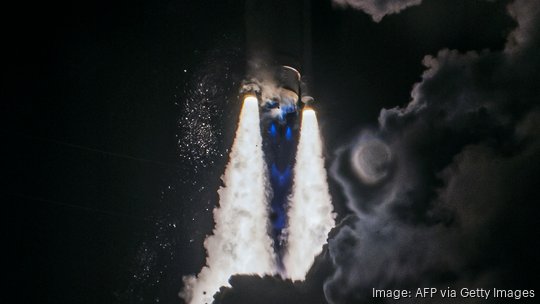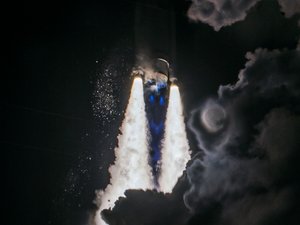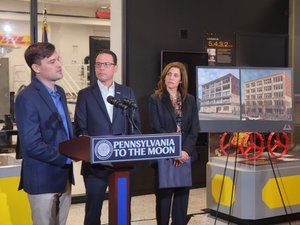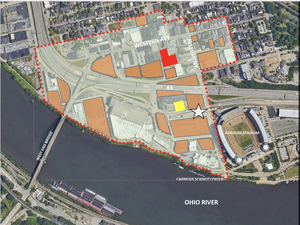
Pittsburgh, we have a problem.
Astrobotic Technology Inc.'s Peregrine Lunar Lander is facing propulsion-related anomalies that the Pittsburgh-based company said, as of Monday afternoon, are threatening to compromise the mission's main objective.
A Vulcan Centaur rocket from United Launch Alliance took Peregrine to about 225,000 miles above the Earth's surface early Monday morning before the two separated.
But about seven hours into its journey to the moon, Astrobotic announced Peregrine began facing a series of challenges, first relating to the positioning of its solar array orientation, which was later identified as being caused by a propulsion anomaly that "threatens the ability of the spacecraft to soft land on the moon," the company said in one of its mission updates.
Engineers, operating out of Astrobotic's Mission Control room in its North Side headquarters, eventually got Peregrine reoriented shortly after its onboard batteries reached "operationally low levels" but work continued to try and solve the failure within its propulsion system, a critical set of rockets that are needed to essentially glide and lower Peregrine down to the moon's surface to prevent a crash landing from happening.
"Unfortunately, it appears the failure within the propulsion system is causing a critical loss of propellant," Astrobotic said in a statement around 1 p.m. Monday. "The team is working to try and stabilize this loss, but given the situation, we have prioritized maximizing the science and data we can capture. We are currently assessing what alternative mission profiles may be feasible at this time."
By Monday evening, Astrobotic tweeted another updated that appears to indicate the spacecraft only has hours remaining before it will likely lose power: "An ongoing propellant leak is causing the spacecraft's Altitude Control System (ACS) thrusters to operate well beyond their expected service life cycles to keep the lander from an uncontrollable tumble. If the thrusters can continue to operate, we believe the spacecraft could continue in a stable sun pointing state for approximately 40 more hours, based on current fuel consumption. At this point, the goal is to get Peregrine as close to lunar distance as we can before it loses the ability to maintain its sun-pointing position and subsequently lose power."
Regardless of Peregrine's fate, Astrobotic and others remain bullish on how everything that's been accomplished thus far has led to a future where Astrobotic, and Pittsburgh more broadly, have a role to play in the ever-growing space industry.
"The Astrobotic team will figure this out, and they will get the win that can be had for this," Brian Kennedy, senior vice president for operations and government affairs at the Pittsburgh Technology Council, said. "There's a lot of new technologies that are being tested here and a lot of significant firsts that were trying to be achieved. … I am optimistic that Astrobotic will continue to play not just a key role with NASA, but well beyond with other space agencies and people who have an interest in space as well."
Prior to the reported anomaly, Pennsylvania Gov. Josh Shapiro issued a statement that implied the state's backing of Astrobotic wasn't contingent on the total success of its first mission. In November 2023, Shapiro announced from Astrobotic's headquarters a $4 million state funding award for the company to use as part of an estimated $20 million renovation plans it's eyeing for a former warehouse on Reedsdale Street.
“We will continue to support and invest in the Commonwealth’s existing high-tech businesses like Astrobotic, as well as other innovative companies looking to come to Pennsylvania," Shapiro said. "We’re working to make Pennsylvania a true hub of innovation, and today’s historic lunar lander mission is a major achievement that shows how Pennsylvania [is] leading the way.”
Astrobotic also is actively working on Griffin, a lander four times the size of Peregrine that will deliver NASA’s water-detecting rover VIPER to the moon within the next two years following a $199 million contract from NASA. The company also has plans to provide sustained power to the moon with permanent electricity, and it could do so by 2028 if all goes according to schedule.
All of this comes amid the ongoing formation of a dedicated Space and Defense Innovation District in the North Side that's anchored by Astrobotic, the nonprofit Keystone Space Collaborative and the U.S. Air Force's AFWERX Hub in Pittsburgh. The themed industry cluster will look to catalyze companies and organizations that are pursuing opportunities beyond the limits of the Earth's surface.
"I think this is a great opportunity for so many reasons," Pittsburgh Mayor Ed Gainey said to a crowd of about 300 people during the announcement of this district last June. "This is fantastic with regards to really being on a new frontier of a new industry that's going to be a $1 trillion [industry by 2040], that's going to be throughout the tri-state region built right here on the North Side. I just think that's phenomenal."









